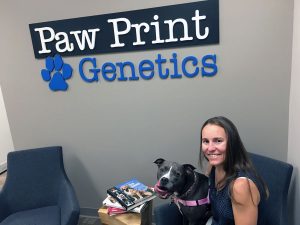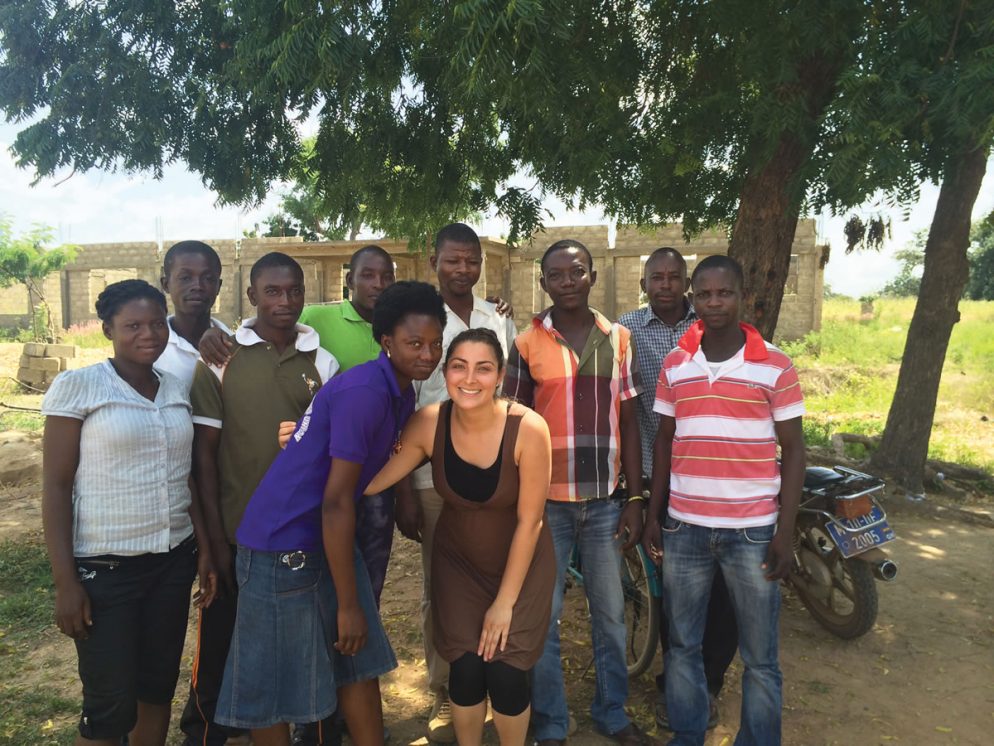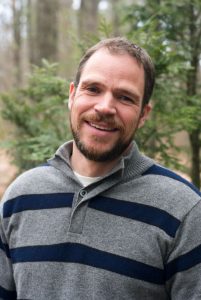Three biology majors. Three different generations. And three completely different paths. All three, however, do agree that a biology degree from a liberal arts institution was a huge benefit to their future. “Being in the science industry now,” says Shazia Ruybal-Pesántez ’12, “I realized it’s actually kind of frowned upon to do a liberal arts degree. … But people tend to get the B.S. in science and all they do is just hard science. I think having that liberal arts background in biology actually makes you more prepared. My life experience is probably different than most people who went to CC so I also have that, but I think in terms of people that I work with, I can definitely tell when someone has more than just science under their belt.” Read on to meet Shazia and two other biology majors who definitely have that something more under their belts.
Shazia Ruybal-Pesántez ’12
Take a peek at the LinkedIn account for Shazia Ruybal-Pesántez and there are so many current positions listed in such varied realms, especially for an alumna just five years out, it almost seems as if it has to be a mistake.
But it’s not.
Currently living in Melbourne, Australia, Ruybal-Pesántez is a Ph.D. candidate in genetics at the University of Melbourne (more specifically, genetic epidemiology of malaria); co-founder and president of the Ecuadorian Research and Entrepreneurship Network nonprofit; and co-founder of the Ecuadorian ethical fashion brand The Artisan Project.
“I’ve always been like that,” she says. “I always do a million things at a time. [The non-Ph.D. work] is just a different side of my brain so I don’t feel like I’m being stretched all over the place.”
How she came to be doing all these things — and from the land down under — is another story. Post-CC, Ruybal-Pesántez moved to New York City, working as a research associate at NYU’s School of Medicine, looking at the diversity of the malaria reservoir of infection (essentially people who are carriers of the parasite but don’t have any symptoms). At the same time, she’d been investigating additional schooling — from a master’s in public health to dietician programs — but hadn’t settled on a direction when her boss at NYU, who happens to be Australian, accepted a job as the dean of the Faculty of Science at the University of Melbourne and as part of her contract, negotiated to bring the whole lab and team from NYU with her.
She offered Ruybal-Pesántez a full-ride scholarship to start her Ph.D. if she wanted to come along. “I was already contemplating a Ph.D., and I knew that I liked this project, and well, Australia. Right? It wasn’t a hard decision.”
When she got to Melbourne, she found that she was more at home than she’d expected. Ruybal-Pesántez is from Ecuador — even though her father is from Colorado, she’d never lived in the U.S. until she attended CC — and she says, “ironically there were lots of Ecuadorian students when I first arrived, something I definitely was not used to because we were like three or four at CC by the time I graduated.”
She joined a student association for Ecuadorian students that got her thinking how she could give back to her home country at a distance.
She and a few of her peers co-founded the Ecuadorian Research & Entrepreneurship Network, a group that she says “stemmed from all of us being abroad, and getting all of these skills and training and higher education degrees, and really wanting to start brainstorming, bring back really innovative ideas to Ecuador.”
But she didn’t stop there. With three business partners in Ecuador, Ruybal-Pesántez also co-founded the Artisan Project, which she describes as more of a personal project. It’s a for-profit business with a social impact model, working hand-in-hand with indigenous artisans in Ecuador. They help with international market access, e-commerce platforms, and product design innovation for handmade items that will draw Australian consumers.
“We’ve started designing some new sorts of products, like iPad sleeves, or yoga mat straps. Things that just wouldn’t be done in Ecuador, but they’re using the textile skills and ancient techniques, still salvaging those and having that cultural expression that’s part of our heritage, but really adapting it to a more global market.”
There’s another impact she’s proud of.
“A lot of the artisans we work with are women, so we’re also interested in doing female empowerment workshops … basic financial planning, and those kinds of things.”
She’s interested in female empowerment elsewhere, too. “In terms of in the sciences, there’s still a lot of gender bias, and discrimination, not so blatant but it’s definitely there. I guess that’s why the Artisan Project for me is such an important project as well because we’re also helping Ecuadorian women have employment, become more independent.
“So yeah, that’s been a side project that’s not really a side project.”
“I’d say, unofficially, our tagline is ‘If it moves, we can catch it,’” says Wing Goodale about his employer, the Portland, Maine-based Biodiversity Research Institute. And he should know. He’s been a part of the nonprofit ecological research group for the past 17 years, working his way up from volunteer to senior deputy director, a position he’s now held for eight years.
“By being able to catch things, everything from bats to insects to any kind of bird you can imagine, you can learn so much about them,” he says. “You can put transmitters on them and track for a year or their whole life cycle. You can take blood samples, understand what kind of contaminant load they have and how that relates to the world that they live in.”
It’s this type of independent, unbiased robust science that BRI conducts to help inform decision makers and the public, he says, from federal and state government officials to other nonprofits to environmental consultants.
The work with BRI keeps Goodale busy, as does being a Ph.D. candidate. He’s in his fifth year at the University of Massachusetts at Amherst. And he says his program is a culmination of all he’s learned over the years — both about the sciences, and himself.
“I left CC with a bio degree. A bio degree is general, right? You cover everything from cell biology to ornithology. I’ve always been interested in birds so … I immediately upon graduation went to Hawaii, and worked out there for half a year. I, as a conservation biologist, had this idea that you do good science, and good science equals good conservation practices. That naïve outlook was challenged substantially out in Hawaii on a very complicated endangered species project I was working on. I realized that wildlife conservation decisions are driven by policy, economics, and people/social sides as much as the science. So after completing my field work, I interned at the Smithsonian Institute in Washington, D.C. to get the policy background.”
He’d go back and forth between field and policy work for a few years, before finally heading to graduate school at the College of the Atlantic in Bar Harbor, Maine.
“I continued studying biology and statistics, but I also took economics and law and got more of a holistic look at conservation practices. I used to think I was going to be this hardnosed scientist, but after the two years I spent conducting field work and two years in graduate school, I shifted to being more of a generalist and integrator.”
His Ph.D. is in environmental conservation and continues on an interdisciplinary thread, he says, “mixing in social science and learning how to learn from people and how to create tools that help people make decisions. … My advisor has partially a social science background, so the pendulum keeps swinging for me from hard science, looking at the animals, to understanding the people, and back.”
It’s an understanding that got its start at CC, Goodale says.
“Being a generalist I’m constantly facing new topics, new languages. The biologists talk one way. The policy folks talk another way. The legal folks talk another way. The economics people talk different ways. So there’s all these different languages and completely different outlooks. I think one of the coolest things I really feel I got from the Block Plan was not being daunted by that newness. And feeling, OK, give me a couple days, give me a week, no, I’m not gonna be an expert, but I can try to get an understanding of this new topic in front of me.”

Christina Ramirez ’00 does canine genetic testing by day, and hangs with her pit bull rescue, Etta James, by night.
Christina Ramirez ’00
After Christina Ramirez received her CC diploma, she headed to graduate school at the University of Washington in the Department of Molecular and Cellular Biology.
“I chose that because it’s a bunch of different disciplines,” she says. “Faculty come from different departments and I didn’t know exactly what I wanted to do.”
She wound up in a genetics lab, working on a variety of projects, one in particular trying to determine whether some mutations of the BRCA1 gene found in human women were likely to be causing cancer.
Because the lab was home to many different projects, she found herself surrounded by a lot of people doing canine genetics. “They used to go to dog shows — the grad students — and I thought that was fun and they’d sometimes send me,” she says. When graduate school wrapped up, Ramirez wasn’t sure of her next steps. She considered a post-doctoral program, and tech jobs, but in the end decided she wanted to go to veterinary school because she realized that in her laboratory, “there were a lot of Ph.D.s doing canine genetics, but not a lot of vets.”
She entered veterinary school at Washington State University and focused on research. Her goal at the time was to apply for a faculty position after completing her DVM, but she says “things weren’t so great then in terms of finding research funding,” so she ended up doing a veterinary pathology residency instead.
“While I was doing that, my mentor in veterinary school contacted me and said that there was this company that was starting up that was doing genetic testing in dogs and they were looking for a medical director … who was a veterinarian.”
With the desired DVM, and a science background as a bonus, she got the job and has been working for Paw Print Genetics since 2013. The company, based in Spokane, Washington, provides canine genetic diagnostic testing and analysis and carrier screenings for dog owners, breeders, trainers, and vets. They also conduct research — one project specifically engages law enforcement bomb and patrol dogs and looks at gene mutations in these particular working breeds.
“There are mutations that are pretty common that affect those dogs later in life,” Ramirez says, “and when you spend thousands of dollars for training with a dog, the last thing you want is its career cut short because of a disease you could have known about before the training even started, or the breeding even started.”
Ramirez says this position has been “kind of a roundabout way to come back to where I started. I feel like everything that I learned benefits me now so I’m happy that I did it this way. … I think a liberal arts education is important for everyone. I feel like it’s good to know a little bit about lots of different things.”

